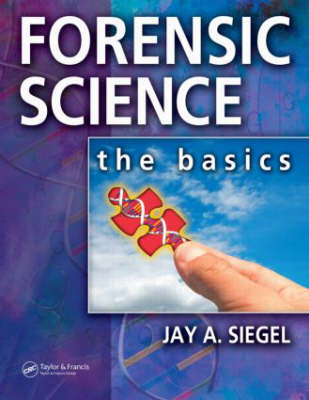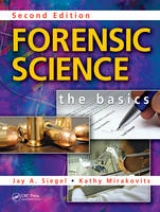
Forensic Science
The Basics, Second Edition
Seiten
2006
Crc Press Inc (Verlag)
978-0-8493-4631-6 (ISBN)
Crc Press Inc (Verlag)
978-0-8493-4631-6 (ISBN)
- Titel erscheint in neuer Auflage
- Artikel merken
Zu diesem Artikel existiert eine Nachauflage
Explains the various aspects of crime scene investigation, covering basic areas of criminalistics and beyond to pathology, anthropology, and engineering. This work explores areas such as forensic entomology. It is suitable for both lower level academic adoptions.
Forensic Science: The Basics explains every aspects of crime scene investigation, moving from basic areas of criminalistics and beyond to pathology, anthropology, and engineering. It also explores new and emerging areas such as forensic entomology. With no previous knowledge of either science or law required, information is self-contained and conveyed at the lowest possible non-scientific level, making this text suitable for both lower level academic adoptions as well as for a general audience. It also offers a complete package of ancillary material for instructors.
Comprehensive and Up-to-Date
• Covers DNA, drugs, firearms, fingerprints, and trace evidence
• Includes cutting-edge material on spectroscopy, chromatography, microscopy, odontology, and entomology
• Demonstrates the practical application of modern chemistry, biology, and other laboratory sciences
Each chapter:
• Opens with learning objectives, a chapter outline, and an introduction
• Closes with a summary and review questions for self-testing
• Contains real-life examples, many from the author’s own experience
Build an exceptional classroom experience with this dynamic resource!
• More than 200 full color nongraphic illustrations
• Countless figures, tables, and charts
• A wealth of supporting material including lecture slides and test questions available on www.classwire.com
• Real case studies to demonstrate forensic concepts in action
• Suggested student projects to reinforce learning
Appropriate for High School and University Students
• Written in the lucid and concise style of a master teacher
• Fully explains the scientific basics required
• Omits potentially traumatic photographs and subject matter
About the Author
Eminently qualified to create this work, Jay Siegel is both a practicing forensic expert and a master instructor. He has worked for the Virginia Bureau of Forensic Sciences and published extensively in the field. He continues to be called upon as an expert witness, having testified over 200 times in state, federal, and military courts across the country. With nearly thirty years of teaching experience, he is highly active in curriculum development for forensic science classes taught at all levels, from junior high through graduate school. He is currently director of the Forensic and Investigative Sciences Program at Purdue University in Indiana.
In February of 2009, Mr. Siegel received the "Distinguished Fellow" award from the American Academy of Forensic Sciences at its annual meeting. This is the highest honor that the Academy bestows upon a fellow. In addition, George Washington University has selected Mr. Siegel for the 2008-2009 "Distinguished Alumni Scholar." This award, the highest that the University bestows upon its alumni, is designated for those who have made truly outstanding contributions to the knowledge base of their disciplines.
For Instructors Only:
Develop and Customize Your Curriculum
Draw from hundreds of PowerPoint® slides and illustrations to supplement your lectures
Organize your class with Dr. Siegel’s helpful outlines and learning objectives
Review answers to end-of-chapter questions
Build exams for different levels from a giant test bank of problems
This book also works in conjunction with Forensic Science Laboratory Manual and Workbook, Revised Edition.
All ancillary material will be available in convenient website format at www.classwire.com.
Upon request, photographs, lecture slides, and a test bank are also available to instructors on CD.
Forensic Science: The Basics explains every aspects of crime scene investigation, moving from basic areas of criminalistics and beyond to pathology, anthropology, and engineering. It also explores new and emerging areas such as forensic entomology. With no previous knowledge of either science or law required, information is self-contained and conveyed at the lowest possible non-scientific level, making this text suitable for both lower level academic adoptions as well as for a general audience. It also offers a complete package of ancillary material for instructors.
Comprehensive and Up-to-Date
• Covers DNA, drugs, firearms, fingerprints, and trace evidence
• Includes cutting-edge material on spectroscopy, chromatography, microscopy, odontology, and entomology
• Demonstrates the practical application of modern chemistry, biology, and other laboratory sciences
Each chapter:
• Opens with learning objectives, a chapter outline, and an introduction
• Closes with a summary and review questions for self-testing
• Contains real-life examples, many from the author’s own experience
Build an exceptional classroom experience with this dynamic resource!
• More than 200 full color nongraphic illustrations
• Countless figures, tables, and charts
• A wealth of supporting material including lecture slides and test questions available on www.classwire.com
• Real case studies to demonstrate forensic concepts in action
• Suggested student projects to reinforce learning
Appropriate for High School and University Students
• Written in the lucid and concise style of a master teacher
• Fully explains the scientific basics required
• Omits potentially traumatic photographs and subject matter
About the Author
Eminently qualified to create this work, Jay Siegel is both a practicing forensic expert and a master instructor. He has worked for the Virginia Bureau of Forensic Sciences and published extensively in the field. He continues to be called upon as an expert witness, having testified over 200 times in state, federal, and military courts across the country. With nearly thirty years of teaching experience, he is highly active in curriculum development for forensic science classes taught at all levels, from junior high through graduate school. He is currently director of the Forensic and Investigative Sciences Program at Purdue University in Indiana.
In February of 2009, Mr. Siegel received the "Distinguished Fellow" award from the American Academy of Forensic Sciences at its annual meeting. This is the highest honor that the Academy bestows upon a fellow. In addition, George Washington University has selected Mr. Siegel for the 2008-2009 "Distinguished Alumni Scholar." This award, the highest that the University bestows upon its alumni, is designated for those who have made truly outstanding contributions to the knowledge base of their disciplines.
For Instructors Only:
Develop and Customize Your Curriculum
Draw from hundreds of PowerPoint® slides and illustrations to supplement your lectures
Organize your class with Dr. Siegel’s helpful outlines and learning objectives
Review answers to end-of-chapter questions
Build exams for different levels from a giant test bank of problems
This book also works in conjunction with Forensic Science Laboratory Manual and Workbook, Revised Edition.
All ancillary material will be available in convenient website format at www.classwire.com.
Upon request, photographs, lecture slides, and a test bank are also available to instructors on CD.
Introduction to Forensic Science. Evidence: Crime Scene to Crime Lab. Illicit Drugs: From Street to the Body. Things that go Boom in the Night: Explosions and Fires. What’s that on your Shirt Collar?: Hairs and Fibers. Paints and Coatings and other Films. Pattern Evidence: From Fingerprints to Firearms. Glass and Soil and other Materials. Blood and Body Fluids: Blood Splatter to DNA. Forensic Pathology: the Investigation of Violent Death. Forensic Anthropology: The Bones of Contention. Forensic Entomology: The Bugs Crawl In, the Bugs Crawl Out, the Bugs Play Pinochle on your Snout. Forensic Engineering: What goes up must come down. Forensic Science and the Law: Don’t do the crime if you cannot do the time.
| Erscheint lt. Verlag | 7.9.2006 |
|---|---|
| Zusatzinfo | 5 Tables, black and white; 219 Illustrations, black and white |
| Verlagsort | Bosa Roca |
| Sprache | englisch |
| Maße | 189 x 246 mm |
| Gewicht | 1769 g |
| Themenwelt | Recht / Steuern ► Strafrecht ► Kriminologie |
| ISBN-10 | 0-8493-4631-2 / 0849346312 |
| ISBN-13 | 978-0-8493-4631-6 / 9780849346316 |
| Zustand | Neuware |
| Haben Sie eine Frage zum Produkt? |
Mehr entdecken
aus dem Bereich
aus dem Bereich
klare Antworten aus erster Hand
Buch | Softcover (2023)
UTB (Verlag)
CHF 27,85



